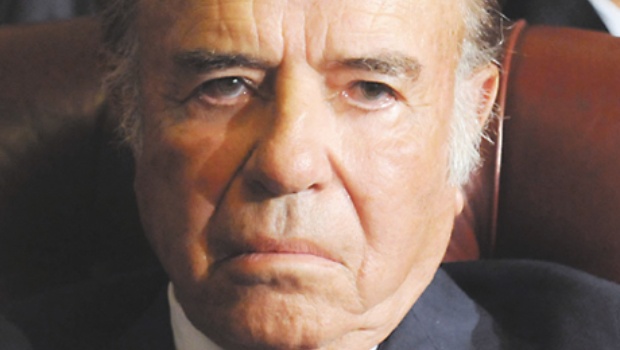Former Argentinian president goes to trial over 1994 bombing of Jewish center
 On the home page of Argentina’s largest Jewish community center is a counter that keeps track of the “days of impunity” since a bomb ripped through the organization’s central building, causing it to collapse and leaving 85 dead amid the rubble.
On the home page of Argentina’s largest Jewish community center is a counter that keeps track of the “days of impunity” since a bomb ripped through the organization’s central building, causing it to collapse and leaving 85 dead amid the rubble.
On Thursday, 7,689 days since the 1994 attack on the Argentine Israelite Mutual Association, former President Carlos Menem, a former top judge and several others will go on trial for allegedly derailing the investigation.
Prosecutors have accused Iranian officials of being behind the bombing. But no one has been convicted in this South American country’s worst terrorist attack, which many Argentines believe has come to symbolize an inept and corrupt justice system that operates at the whims of politicians and can be bought off.
“After 21 years of no justice, deception and defrauding the families (of victims), we hope that the truth will emerge about everyone who plotted to cover up and derail the investigation,” said Olga Degtiar, whose son was killed in the blast.
The 13 facing charges include two former prosecutors, a former top intelligence official, former police officers, a Jewish community leader and a mechanic who owned the truck carrying the explosives. The charges carry between three and 15 years.
The trial, expected to go on for months, will focus on how and why Menem and the others might have wanted to bury the initial investigation. Testimony will likely delve into geopolitics of the 1990s, and even into Menem’s Syrian ancestry and how that might have influenced him.
Menem, whose parents immigrated to Argentina from Syria, was president between 1989 and 1999. Since 2005, the now 85-year-old has been a senator representing La Rioja province, where he was born.
Argentine authorities have long accused Iran and the [terrorist] group Hezbollah of being behind the attack. To this day, several Iranian officials are on Interpol’s red alert list, though the Middle Eastern country has always denied involvement.
Prosecutor Sabrina Namer is expected to argue that former Judge Juan Jose Galeano, on orders from Menem, stopped investigating a “Syrian trail” that involved Syrian-born Alberto Kanoore Edul. Edul was detained when authorities discovered he had telephoned Carlos Telledin, a mechanic who owned the truck that carried the explosives, days before the attack.
Edul, whose parents had a personal relationship with the Menem family, was also suspected because he had a planner that included the phone number of Moshen Rabbani, at the time the cultural attache at the Iranian Embassy in Buenos Aires.
Prosecutors have accused Rabbani of masterminding the attack and continue to seek his extradition. Edul, who died in 2010, denied involvement.
In an interview with The Associated Press, Galeano denied that he received any orders from Menem. He said Edul wasn’t investigated further because there was no hard evidence against him.
Calls to Menem’s lawyers seeking comment were not returned.
Another central part of the cover-up charges involve the 1996 payment of $400,000 to Telleldin, at the time the only person detained in connection with the bombing. Galeano negotiated the payment, which came from funds from the now defunct Secretary of State Intelligence spy agency.
The stated reason behind the money was to persuade Telleldin to tell authorities to whom he had given the truck. Telleldin implicated several police officers of the Buenos Aires province, a force that at the time was largely discredited in the midst of several corruption scandals.
A dozen officers were detained and went on trial in 2001. The case dragged on, then after three years a mistrial was declared on the grounds that the payment to Telleldin had influenced his testimony. The 19 people on trial, including Telleldin and the officers, were absolved. Telleldin and some of the officers have been charged in the cover-up trial.
Galeano told the AP the payment was a bad decision, but said that at the time authorities were desperate to solve the case.
